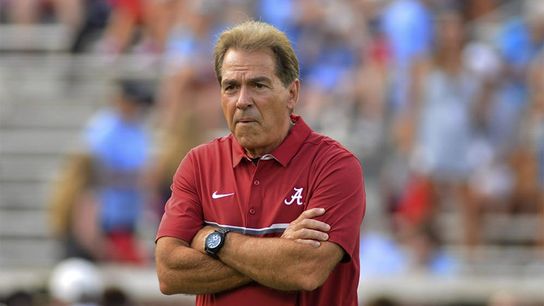A year ago, I dug into the archives to quantify the insane level of staff turnover Alabama had endured over the past few years. At that time, Nick Saban had cycled through four offensive coordinators in four seasons, four quarterbacks coaches in four seasons, four wide receivers coaches in four seasons, three defensive coordinators in three seasons and seven defensive backs coaches in seven seasons.
The Crimson Tide won two national titles over that span and recruited No. 1 classes annually, but that level of turnover had to be unsustainable, right? Right?
Turns out, Saban agreed. Alabama missed the College Football Playoff for the first time in the 6-year history of the system and dropped two regular season games for the first time since 2010, but Saban retained nearly his entire staff. Defensive line coach Brian Baker was demoted to an off-the-field role -- he's since left for the Indianapolis Colts -- and Freddie Roach was hired back as his replacement. Other than that relatively minor move (the Tide is now on its fourth D-line coach in as many years), Saban kept the band together.
And then Monday happened.
Scott Cochran rocked the college football world when he walked away from his 13-year role as Alabama's defensive line coach to become Georgia's special teams coordinator.
Cochran was part of the reason Alabama sustained that game of musical chairs in the staff room. He was the coach who had day-to-day contact with the players, the guy who put Saban's plan into action, the COO of Process, Inc.
With Cochran gone, the dean of Saban's senior-level coaching staff is now Pete Golding, who's spent all of 28 games in crimson and white.
The median hire date for Saban's staff is Feb. 15, 2019 -- 54 weeks ago. If the new strength coach was hired today, the average duration of Saban's 11 most important assistants would be 386 days.
Now, the question I asked last year still applies: How much does this really matter?
And the truth is that's really hard to answer, especially when trying to forecast the departure of one assistant coach into future wins and losses. Alabama worked in six new assistants last year and lost two games, but they also suffered abnormally bad injury luck. One of those two losses came via two pick-sixes thrown by their backup quarterback, and even then that game would've gone to overtime if their kicker hadn't missed a final-minute chip shot.
So, again, how much does any of this really matter?
It's not as if Cochran was Alabama's only strength coach, and Saban's been at Alabama so long that his lieutenants now have their own lieutenants, and any departed assistant can easily be replaced by someone else with Saban connections. On the current staff, Sarkisian, Sunseri and Roach are all in their second stints working under Saban, and Kelly coached previously under Saban disciples Jimbo Fisher and Jeremy Pruitt. In the strength world, Oregon's Aaron Feld, Ole Miss's Wilson Love, Louisiana-Lafayette's Mark Hocke and South Carolina's Jeff Dillman all have varying degrees of connections to Saban.
Thirteen years is a long time for one head coach to remain in one place, and it's several lifetimes for a strength coach. There's no doubt Cochran's loss will be felt -- especially the timing of his departure, right at the beginning of the Fourth Quarter program, when Cochran and his staff begin preparing the players' bodies for the upcoming season. But, just as Rome wasn't built in a day, it won't fall in a day, and it damn sure wasn't built on the back of the strength coach, no matter how good he was at the job.
Lest we forget, the most important piece of the puzzle is still in place: The Man himself. Actually, Saban isn't just a piece of the puzzle, he is the puzzle.
Take, for example, this answer Saban gave to ESPN on a topic completely unrelated to Cochran, for a piece published Wednesday. Emphasis mine.
"...So instead of having 18 seniors, you've got eight. You really have a three-year program at a place like this. I'm not necessarily saying it's going to hurt our program because we'll do a hell of a job recruiting players leaving other places to come here. But is that good for college football?"
The Machine loses parts from time to time, but it replaces those parts and it keeps on chugging, right over the backs of the competition. The 2020 Alabama team that someone else will now train is comprised largely of recruiting classes ranked No. 5 (2018), No. 1 (2019) and No. 2 (2020).
Alabama has largely left the rest of college football in the dust, competing in a stratosphere comprised only of LSU, Georgia, Clemson and Ohio State. It's possible we could look back at a hypothetical loss to one of those giants and pinpoint the blame on the exit of a single coach. But that single coach is probably Nick Saban.
